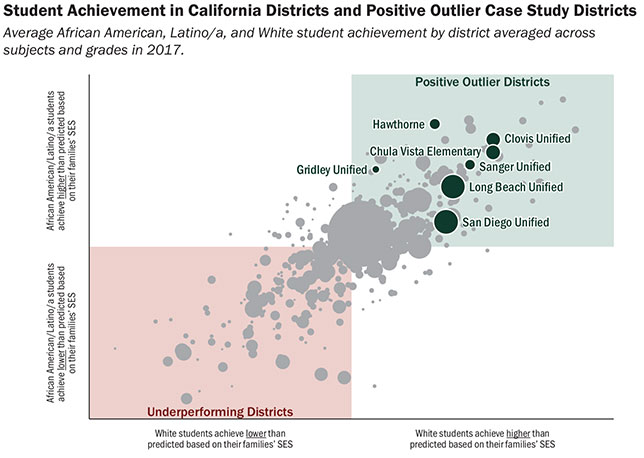Developing Methods to Narrow the Achievement Gap
School districts with large differences in student racial and socioeconomic backgrounds can face disadvantages when it comes to student success. A new study from the Learning Policy Institute explains how seven school districts in California were able to make systemic changes, such creating professional learning opportunities and developing a stronger focus on curriculum development, to improve student outcomes.
This report builds on earlier quantitative research from LPI to determine why some school districts called "positive outliers" don't follow the stereotypical district profile. Researchers chose to focus on seven districts across the state with a range of different diversity levels for the new study.
Developing strategies to promote "a strong, stable educator workforce" through recruiting teachers with advanced credentials, providing them support and determining incentives to retain quality those educators is a critical component to closing the opportunity gap in all schools.
Other methods for closing the gap include:
- A widely shared, well enacted vision that prioritizes learning for every child
- Continuous leadership from instructionally engaged leaders
- Collaborative professional learning that builds collective instructional capacity
- A deliberate, developmental approach to instructional change
- Curriculum, instruction and assessment focused on deeper learning for students and adults
- Use of evidence to inform teaching and learning in a process of continuous improvement
- Systemic supports for students’ academic, social, and emotional needs
- Engagement of families and communities
"We hope that other school districts and states will focus on the lessons from these case study school districts to ensure all students have access to deeper learning regardless of the size, location, and wealth of the district where they go to school. We know it can be done," said LPI President Linda Darling-Hammond.

In addition to analyzing common district characteristics for success, LPI has outlined a series of recommendations for policymakers to improve student learning outcomes at the federal, state and local levels:
- Developing a stable supply of well prepared, instructionally engaged teachers and leaders.
- Supporting the capacity-building for high-quality instruction and focusing on instructional change.
- Using assessments and data strategically to support continuous improvement.
- Creating coherent systems of support based on student needs, including academic, social, and emotional learning.
- Allocating resources for equity.
The full results and recommendations of the study can be found on LPI's website.
About the Author
 Sara Friedman is a reporter/producer for Campus Technology, THE Journal and STEAM Universe covering education policy and a wide range of other public-sector IT topics.
Sara Friedman is a reporter/producer for Campus Technology, THE Journal and STEAM Universe covering education policy and a wide range of other public-sector IT topics.
Friedman is a graduate of Ithaca College, where she studied journalism, politics and international communications.
Friedman can be contacted at [email protected] or follow her on Twitter @SaraEFriedman.
Click here for previous articles by Friedman.